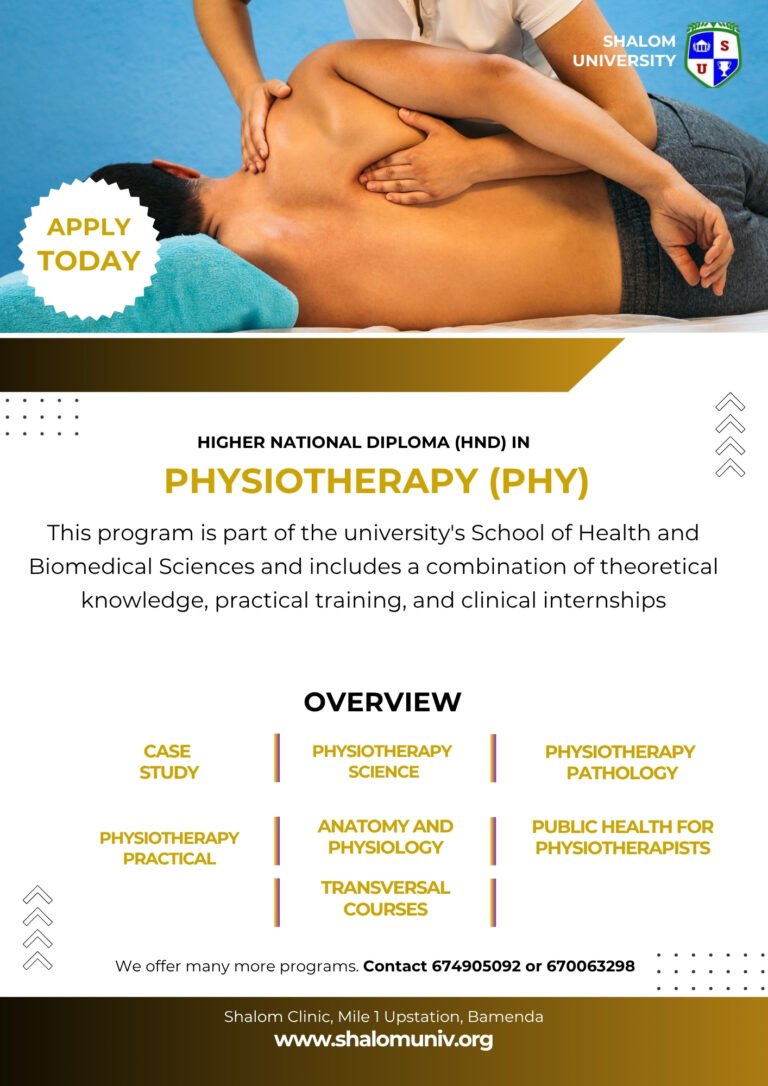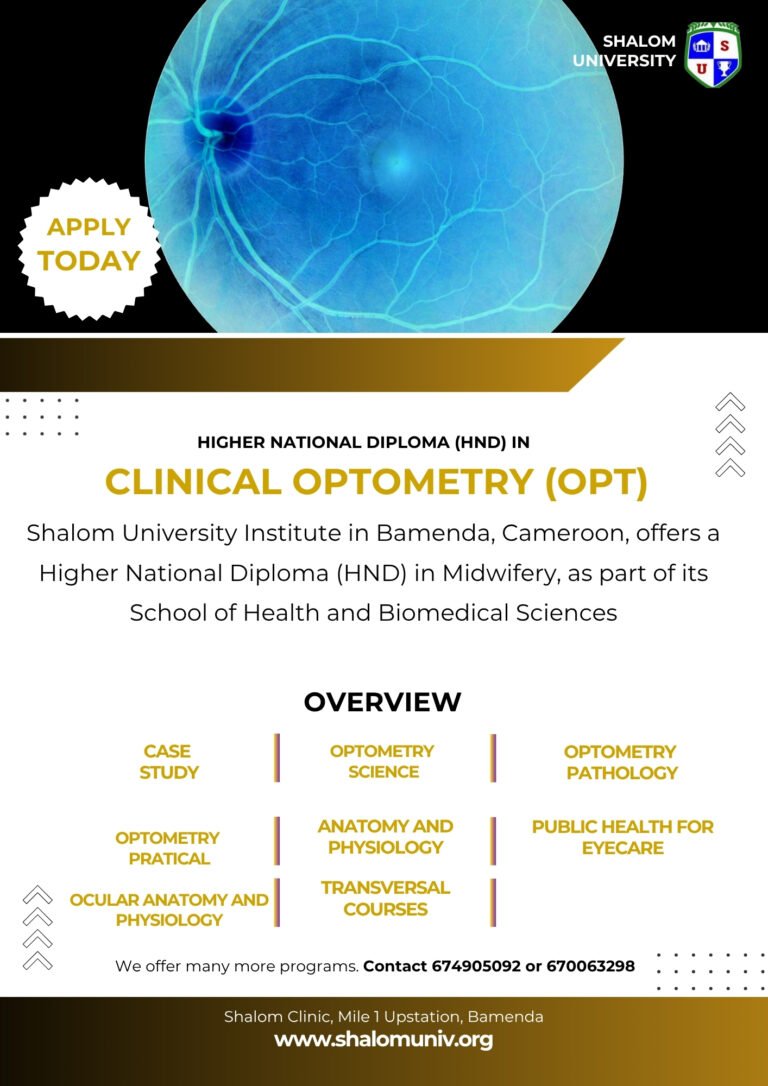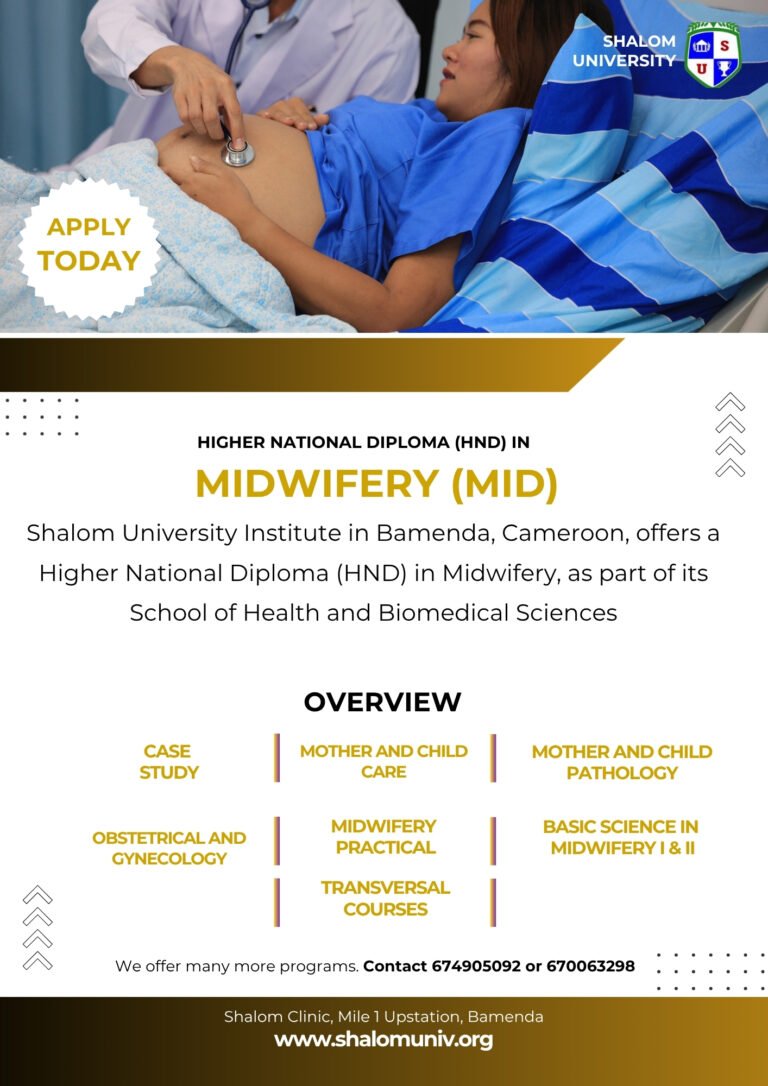In Cameroon, where food security challenges and a ‘dual burden’ of malnutrition persist, the expertise of trained nutritionists and dieticians is essential. The HND in Nutrition and Dietetics (NUD) at Shalom University in Bamenda provides aspiring professionals with the knowledge and skills to address these critical public health issues, ensuring graduates are well-prepared to improve nutritional health across the country. This program focuses on translating scientific principles into practical, evidence-based dietary solutions for individuals and communities.
The curriculum at Shalom University is designed to be both rigorous and locally relevant, blending core nutritional sciences with community health perspectives. Graduates are trained not only to work in clinical settings but also to manage food service systems and implement public health interventions in diverse Cameroonian populations.
The NUD Curriculum at Shalom University
The HND in Nutrition and Dietetics at Shalom University is structured around a comprehensive set of core papers that develop a student’s expertise in nutritional science and its practical application.
Paper: Case Study
The Case Study paper is a vital component that integrates all the theoretical knowledge and clinical skills gained throughout the program. It challenges students to analyze complex patient scenarios, from initial diagnosis to treatment planning and follow-up. This is particularly relevant for nutritionists and dieticians in Cameroon, who often work with patients facing a mix of nutritional deficiencies and chronic diseases.
The course trains students to:
- Evaluate patient nutritional status: Based on a given patient case, students must assess the individual’s nutritional needs and identify any deficiencies or excesses.
- Develop individualized dietary plans: Students devise a personalized dietary plan that addresses the patient’s specific health condition, cultural food preferences, and socioeconomic status. For example, a case study might involve a patient with diabetes, requiring a tailored meal plan using locally available, affordable foods.
- Integrate multi-disciplinary perspectives: The case study format encourages students to consider insights from biochemistry and microbiology to develop a comprehensive, evidence-based care plan.
- Defend their decisions: During formal presentations, students must justify their nutritional diagnoses and treatment choices, demonstrating their clinical reasoning and critical thinking skills.
Paper: Food Biochemistry
Food Biochemistry provides a foundational understanding of the chemical composition of foods and the metabolic processes of the human body. This paper is essential for nutrition professionals who need to understand how nutrients are processed and utilized to maintain health. The course is particularly relevant to the Cameroonian context, where a diverse range of local foods constitutes the basis of most diets.
Key topics include:
- Macronutrients and Micronutrients: A detailed study of carbohydrates, proteins, fats, vitamins, and minerals, focusing on their structure, function, and dietary sources.
- Digestion and Metabolism: Understanding how the body digests, absorbs, and metabolizes food to produce energy and support physiological processes.
- Food Composition Analysis: Learning how to analyze the nutrient composition of different Cameroonian foods, which is essential for creating accurate dietary plans and advising on local food sources.
- Dietary-Drug Interactions: An introduction to how food can affect the efficacy and metabolism of medications, which is vital for patient counseling, particularly for patients with conditions like HIV/AIDS and diabetes.
Paper: Food Microbiology
Food Microbiology is a critical subject for nutrition and dietetics students, providing an understanding of the microorganisms in food and their impact on food safety and human health. This knowledge is essential for preventing foodborne illnesses and ensuring good hygiene practices, both in clinical settings and in the broader community.
The curriculum covers:
- Microorganisms in Food: Identification of bacteria, viruses, and fungi found in food and their role in spoilage and disease.
- Food Preservation: An exploration of various food preservation techniques, which are crucial in a context where refrigeration and modern storage facilities may be limited.
- Food Safety and Sanitation: Protocols for ensuring food safety and proper sanitation in food handling, preparation, and storage, which is vital for preventing disease outbreaks in clinics and the community.
- Infection Control: Understanding how foodborne pathogens can be transmitted and implementing infection control measures to protect vulnerable populations.
Paper: Nutritional Needs and Dietary Allowance
This paper focuses on the principles of assessing nutritional needs and determining appropriate dietary allowances for different individuals and population groups. In Cameroon, where malnutrition affects a significant portion of the population, understanding these principles is key to creating effective nutritional interventions.
The curriculum addresses:
- Life-Cycle Nutrition: The specific nutritional requirements for different life stages, from infancy and childhood to pregnancy, lactation, and old age. This is vital for addressing infant feeding practices and maternal health in Cameroon.
- Dietary Guidelines: Understanding national and international dietary guidelines and translating them into practical recommendations for the Cameroonian population.
- Dietary Planning and Meal Management: Practical skills in planning balanced and nutritious meals for individuals and large groups, considering local food availability and affordability.
- Clinical and Community Nutrition Assessment: Learning to assess the nutritional status of individuals and communities, identify malnutrition (both undernutrition and overnutrition), and implement interventions to improve nutritional outcomes.
A Career Serving the Community
Graduates of the HND in Nutrition and Dietetics from Shalom University are well-prepared to make a significant impact on the health and well-being of the Cameroonian population. They can work in various settings, including hospitals, community health centers, educational establishments, and the food industry. Their skills are essential for addressing the dual burden of malnutrition, promoting healthy eating habits, and ensuring food safety.
With their training in Food Biochemistry, Food Microbiology, and Nutritional Needs, graduates can contribute to improving maternal and child nutrition, managing chronic diseases through medical nutrition therapy, and developing effective nutrition education programs in schools and communities. The Case Study paper ensures that they are not just knowledgeable but also skilled critical thinkers, ready to address the complex nutritional challenges facing individuals and communities in Cameroon. By training competent nutrition professionals, Shalom University plays a vital role in building a healthier future for the nation.




